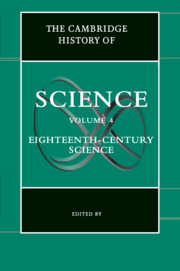Book contents
- Frontmatter
- 1 Introduction
- Part I Science and Society
- Part II Disciplines
- 10 Classifying the Sciences
- 11 Philosophy of Science
- 12 Ideas of Nature: Natural Philosophy
- 13 Mathematics
- 14 Astronomy and Cosmology
- 15 Mechanics and Experimental Physics
- 16 Chemistry
- 17 The Life Sciences
- 18 The Earth Sciences
- 19 The Human Sciences
- 20 The Medical Sciences
- 21 Marginalized Practices
- Part III Special Themes
- Part IV Non-Western Traditions
- Part V Ramifications and Impacts
- Index
- References
11 - Philosophy of Science
from Part II - Disciplines
Published online by Cambridge University Press: 28 March 2008
- Frontmatter
- 1 Introduction
- Part I Science and Society
- Part II Disciplines
- 10 Classifying the Sciences
- 11 Philosophy of Science
- 12 Ideas of Nature: Natural Philosophy
- 13 Mathematics
- 14 Astronomy and Cosmology
- 15 Mechanics and Experimental Physics
- 16 Chemistry
- 17 The Life Sciences
- 18 The Earth Sciences
- 19 The Human Sciences
- 20 The Medical Sciences
- 21 Marginalized Practices
- Part III Special Themes
- Part IV Non-Western Traditions
- Part V Ramifications and Impacts
- Index
- References
Summary
In recent years philosophy of science and the history of philosophy of science have been subjected to a number of critiques by scholars from areas such as sociology of science and history of science. The following is a litany of some of their complaints. Philosophers of science (it is argued) do not deal with the practical engagement with the world that is the central part of scientific activity, and their view of the nature and function of scientific theory is fanciful and biased (“theory” is seen as prior to, and more historically significant than “practice”). Historians of philosophy anachronistically decide what constituted important problems in the past, selecting for study the works of great men whose doctrines they wrench from their historical contexts. They then misinterpret and present the corpus of an individual’s published writings as if it were coherent across various projects and over lengthy periods of time. Philosophers are taken to be in dialog with the timeless problems of their ancestors, and the “progressive, ” pure aspects of scientific work are divorced from other areas of an individual’s intellectual output, such as theology and economics, which are seen as inferior productions. In dealing with the legacy of Newton, “Newtonians” merely develop and never radically challenge powerful suggestions that are inherent within the public texts of the Master, whereas “anti-Newtonians” are lumped together, whatever their doctrines, and whatever the traditions within which they write. As one corollary of Newtonocentrism, historians have tended to argue that all decent examples of exact science in the eighteenth century are the result of successfully grappling with problems laid out or “hinted” at in Newton’s works.
- Type
- Chapter
- Information
- The Cambridge History of Science , pp. 267 - 284Publisher: Cambridge University PressPrint publication year: 2003
References
- 4
- Cited by

